CHOREOGRAPHIC METHODS
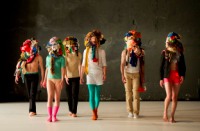
© Laurent Philippe
In the recent past, the creative process has often been more at the centre of attention than the choreographic work. In the search for alternative strategies to arrive at formal solutions, choreographers have developed notation and composition methods with which they delegate the authorship to their dancers or also to the audience. Artists such as Jonathan Burrows, Joanne Leighton and Krõõt Juurak present their experimental working methods, others talk about their experiences with the “misery of form”. Choreographers and dramaturges discuss the function and characteristics of dramaturgy in dance. Further events are dedicated to dialogues between the arts, between disabled and non-disabled bodies, as well as between dance and new media.
Fri, 7 June 17:00
-
17:00 - 17:45 Capitol, Club Video
Talks on Dramaturgy
The relationship between choreographers and dramaturges continuously changes during the course of their collaboration. Based on selected productions, William Forsythe, Reggie Wilson and Sidi Larbi Cherkaoui talk with their dramaturges about their role in the artistic process, about research interests and working methods. What kind of knowledge and what competences do dramaturges contribute to the process? How do the translation processes between language and movement evolve? At which moments are dramaturges especially needed and when do they disturb? Is the dramaturgic function actually only reserved to the dramaturge?
For Freya Vass-Rhee, the dramaturge of The Forsythe Company, the company is an ensemble of dramaturges. She understands dramaturgy as a collective process in which the choreographer, the designated dramaturge as well as the dancers and other persons participate. Although several physical and conceptual dramaturgies are at work, dramaturgical accordance is not prioritised. This working method ensures artistic autonomy and additionally results in works whose “meanings” are not fixed and that remain open for changes. This not only questions the role but also the necessity of the dramaturge. Freya Vass-Rhee has invited William Forsythe and the dancer David Kern to share their views of the dramaturgical ensemble practice.
William Forsythe (D) choreographer
Freya Vass-Rhee (D) dramaturge
David Kern (D) dancer
Sat, 8 June 10:00
-
10:00 - 11:00 tanzhaus, Kleiner Saal
Krõõt Juurak
Scripted Smalltalk
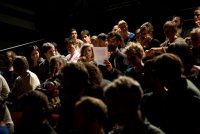 © Ouidade Soussi Chiadmi
© Ouidade Soussi ChiadmiIn Krõõt Juurak’s performance ‘Scripted Smalltalk’, the artist gives out candies and vodka to members of the audience and asks them to recite scripted dialogues. The texts deal with trivial or existential themes such as TV series, love, chaos, and communication. The voices and gestures of the audience gradually form a choreography on their own. ‘Scripted Smalltalk’ explores the relationship between audience and artwork, and reveals that the mere speaking of a text is already a performative act. A humorous exploration of theatrical mechanisms – without any theoretical gesture whatsoever.
By Krõõt Juurak (EST/A)
With the audience -
10:00 - 13:00 tanzhaus, Studio 4
Inclusive Working in Practice
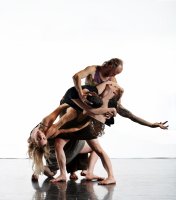 © Hugo Glendinning
© Hugo GlendinningSince 1991 the Candoco Dance Company has been the world’s leading dance company for disabled and non-disabled dancers and at the same time a role model for generations of young artists. By dealing with non-normalised bodies in a natural way, the company does away with stereotypes and questions the common notions of physical capability and artistic work. The workshop for professional dancers, choreographers, and teachers combines dance technique with creative choreographic tasks, invites the participants to exchange their views on the concepts of normalcy and disability and assists them in gaining a more profound understanding of inclusive dance practice.
Registration required
Mirjam Gurtner (UK), Vicky Malin (UK) dancers Candoco Dance Company
-
10:00 - 13:00 tanzhaus, Studio 3
Dance Dramaturgy as a Creative and Somatic Practice
In the workshop, Guy Cools demonstrates the role of the dance dramaturge in the creative process using concrete case studies from his work with les ballets C de la B, Sidi Larbi Cherkaoui and Akram Khan. In his view, the dramaturge is not a purely intellectually analysing outside authority, but a dialogue partner of the artists, who is also physically involved in the choreographic process. In group discussions and practical movement exercises, the participants themselves will experience the different roles as witness, moderator and critical viewer.
Registration required
Guy Cools (B) dramaturge, curator
Sat, 8 June 11:00
-
11:00 - 11:45 Capitol, Club Video
Intermedia Movements
Moving into New Media Dramaturgy
What does it entail for the audience, when in a work by the Japanese collective Dumb Type the performers disappear in an inferno of light flashes and video projections? Peter Eckersall has delved into choreographic art that deals with socially relevant themes through the interplay of bodies and technology and coined the term “New Media Dramaturgy” to describe it. Using the example of the work of Dumb Type, who in the mid-1980s have introduced a totally new aesthetics in the field of dance through their innovative and at once technology-critical pieces, Eckersall examines the means and compositional principles of multimedia and intermedia work.
Peter Eckersall (AUS) theatre scholar
-
11:15 - 12:00 tanzhaus, Studio 6 Video
Choreographing Following the Principle of ‘Exquisite Corpse’
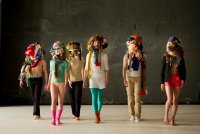 © Laurent Philippe
© Laurent PhilippeIn her work ‘Exquisite Corpse’, Joanne Leighton examines the possibilities of passing on choreography and simultaneously questions the traditional concept of the author. Upon her invitation, 57 choreographers jointly produced a “cadavre exquis” (“exquisite corpse”) in the spirit of the French Surrealists. Each artist developed a one-minute “choreographic module” and then passed the last ten seconds on to the next colleague, who then in turn took them as the starting point of a new sequence. In this lecture demonstration, Leighton presents the project and the work process as well as excerpts from the choreographic material.
Joanne Leighton (F) choreographer
Sat, 8 June 12:00
-
12:30 - 13:00 tanzhaus, Großer Saal
Jonathan Burrows & Matteo Fargion
One Flute Note
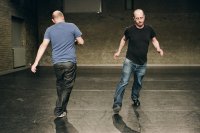 © Herman Sorgeloos
© Herman SorgeloosWith simplest means such as gestures and sounds, Jonathan Burrows and Matteo Fargion have been developing minimalistic duets for several years, which are not only breathtakingly virtuoso but also entertaining with a wink. Their work combines formal stringency with a humorous nearness to the audience. In ‘One Flute Note’, the British choreographer and Italian composer continue their critical conversation with John Cage’s legendary, performative ‘Lecture On Nothing’, which like hardly another has influenced the development of contemporary dance and performance art.
By/with Jonathan Burrows (UK), Matteo Fargion (I/UK)
‘One Flute Note’ is supported by Arts Council England
Jonathan Burrows & Matteo Fargion are supported by Kaaitheater Brussels, PACT Zollverein Essen, Sadler’s Wells Theatre London, BIT Teatergarasjen Bergen
Sat, 8 June 14:00
-
14:30 - 15:00 Capitol, Club
Reggie Wilson
Introduction
Reggie Wilson is one of the leading African-American choreographers in the United States. With his company, the Fist and Heel Performance Group, he merges contemporary dance with African traditions to create a hybrid form which he terms “Post-African Neo Hoodoo Modern Dance”. Wilson’s famous solo ‘Introduction’ starts like a sober, autobiographical lecture and then gradually turns into a trance-like celebration of Christian rituals from the Black Diaspora. Inspired by the practices of the Spiritual Baptists in Trinidad and the Zionists in Zimbabwe, the solo organically intertwines text and movement.
Created/performed by Reggie Wilson (USA)
Sat, 8 June 15:00
-
15:00 - 15:45 Capitol, Club Video
Talks on Dramaturgy
The relationship between choreographers and dramaturges continuously changes during the course of their collaboration. Based on selected productions, William Forsythe, Reggie Wilson and Sidi Larbi Cherkaoui talk with their dramaturges about their role in the artistic process, about research interests and working methods. What kind of knowledge and what competences do dramaturges contribute to the process? How do the translation processes between language and movement evolve? At which moments are dramaturges especially needed and when do they disturb? Is the dramaturgic function actually only reserved to the dramaturge?
Reggie Wilson’s choreographies draw from the spiritual traditions of the African Diaspora. With body percussion, rhythmic singing and cries, they take up the religious culture of black slaves. Together with his dramaturge Susan Manning, Wilson give insights into the work on his most recent production ‘(project) Moseses Project’, which deals with the question of leadership and followers. Important sources of inspiration for the work were travels to Israel, Egypt, Mali, and Turkey, as well as the novel ’Moses, Man of the Mountain’ by the folklorist Nora Zeale Hurston, which from an African perspective delves into the Exodus myth.Reggie Wilson (USA) choreographer, performer
Susan Manning (USA) dance scholar
Sat, 8 June 16:00
-
16:15 - 18:00 tanzhaus, Kleiner Saal
Show Doctor, or Accomplice from the Start?
Production Dramaturgy in Dance
Dramaturges are all-rounders: They mediate between choreographer and the audience, between choreographer and institution. A feeling for psychology mingles with a high sense of aesthetics and a deliberately maintained distance. This lab is dedicated to the production dramaturgy in dance: When is it fruitful, when does it fail? How can work with a dramaturge be shaped? When and how can he or she be involved as an accomplice and mediator? We will work out criteria that outline what contemporary dance dramaturgy should and can accomplish in the production process.
Guy Cools (B) dramaturge
Henrike Kollmar (D) dramaturge tanzhaus nrw
Martin Nachbar (D) choreographer
Constanze Schellow (D/CH) dance scholar
Freya Vass-Rhee (D) dramaturge The Forsythe CompanyConcept/Moderation:
Anne Kersting (D), Amelie Mallmann (D) dramaturges
In cooperation with Dramaturgische Gesellschaft -
16:15 - 18:45 tanzhaus, Studio 3
The Misery of Form
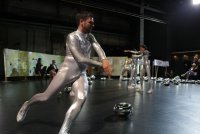 © Anja Beutler
© Anja BeutlerConducting research on movement instead of spectacle, dissolving the concept of the author and favouring collaborative processes instead of the final work: These are issues that contemporary dance has been concerned with for quite a while. At the same time, a need for composition, intention and dance movement is repeatedly voiced by the media and the audience. The interest in the process thus stands in opposition to a desire for form. Beyond ideological attributions, the participants of the salon examine the concept of form in the field of tension between artists, audience, artistic “object”, and the market. What demands have recently been made on dance, and what role can processes of arriving at formal solutions play in this regard?
Jonathan Burrows (UK) choreographer
Susanne Foellmer (D) dance scholar
Laurent Goldring (F) visual artist
Isabelle Schad (D) dancer, choreographer
Britta Wirthmüller (D) choreographer
Sun, 9 June 11:00
-
11:00 - 13:30 tanzhaus, Studio 4
Rausch
Collaboration between Movement, Sound, and Text
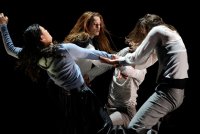 © Sebastian Hoppe
© Sebastian HoppeThe director and author Falk Richter and the choreographer Anouk van Dijk develop their pieces in an open research, writing and rehearsal process. Based on their most recent production ‘Rausch’, the workshop participants are given a view of the working mode of the two. How can dance and acting encounter each other, how can dancers and actors jointly improvise with text and movement? Who is oriented towards whom, who inspires whom, what can a joint, content-related search be like? The participants should have seen the performance of ‘Rausch’ and read the texts of Falk Richter beforehand.
Further information/texts: falkrichter.com
Registration required
Bring training clothesFalk Richter (D) director, author
Thomas Wodianka (D) actor
Nina Wollny (D) dancer
Sun, 9 June 12:00
-
12:00 - 13:30 Capitol, Club Video
Talks on Dramaturgy
The relationship between choreographers and dramaturges continuously changes during the course of their collaboration. Based on selected productions, William Forsythe, Reggie Wilson and Sidi Larbi Cherkaoui talk with their dramaturges about their role in the artistic process, about research interests and working methods. What kind of knowledge and what competences do dramaturges contribute to the process? How do the translation processes between language and movement evolve? At which moments are dramaturges especially needed and when do they disturb? Is the dramaturgic function actually only reserved to the dramaturge?
Since 2008, Guy Cools has been curating a series of so-called ‘body: language talks’ in which he questions artists on their approach to the body. For the Dance Congress, he will talk with the Flemish choreographer Sidi Larbi Cherkaoui about themes that played a role in their relationship as choreographer and dramaturge, e.g., working with bodies beyond the norm, the non-hierarchical attitude towards body images from different cultures and the special significance of bodily rhythm and energy.
Sidi Larbi Cherkaoui (B) choreographer
Guy Cools (B) dramaturge, curator -
12:00 - 13:30 tanzhaus, Kleiner Saal
On Mentoring
Jonathan Burrows presents two short talks on mentoring, written by himself and the performer Chrysa Parkinson for the What_Now Festival, London in April this year. These talks formed part of a seminar to discuss what mentoring might be, how it works, why it sometimes does not work and what the personal, political, educational and creative imperatives behind the practice are. These talks look in particular at the political aspect of mentoring and the way it has been encouraged from the outset by organisers and funding bodies rather than being a demand from artists, which is a continuing pattern and once which often colours the experience and affects the outcomes. Burrows will be joined onstage by Nik Haffner, who together will facilitate a focused discussion afterwards around the issues raised.
‘On Mentoring’ replaces ‘Writing Dance’
Jonathan Burrows (UK) choreographer
Nik Haffner (D) choreographer, lecturer Hochschulübergreifendes Zentrum Tanz Berlin